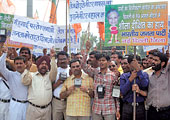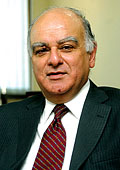 |
| Mumbai blackout: Until recently, outages
were unheard of in the city, but now they have become commonplace |
Last
summer, Indrani Mukherjee, a resident of Dum Dum Park, Kolkata,
decided to make do with an inverter that would power a few lights
and fans when the local power distribution utility switches off.
This summer, her faith in the utility's services has not improved.
Rather, she is shopping for more storage devices. "I stay
in a top floor apartment, where I operate an air-conditioner to
beat the heat. But, what's the point, if I cannot run it, thanks
to frequent power supply disruptions?" says Mukherjee. "I
am now scouting the market for an inverter that can operate the
ACs during the power cuts."
This tale can perhaps be heard echoing in
several cities across the country, thanks to the crippling shortages
that get accentuated during the summer months. But what makes
this summer different from the earlier ones? The economic boom
witnessed during the recent past has fuelled the buying power
of consumers in the domestic and commercial segment in several
power-starved cities. Ironically, the very same reason is also
fuelling demand for power that the sector is unable to deliver.
The play out of this vicious cycle in the domestic and commercial
segment of consumers is interesting.
First, power-deficit states (like Maharashtra
and Andhra Pradesh) are resorting to purchase of expensive power
from power-surplus states (Orissa and Jharkhand, for example).
Secondly, growth in the power storage and micro-generation business
is on the rise (See Taking Advantage of the Shortages). Thirdly,
the power shortages bring out the stark rural-urban divide. With
economic growth not having been inclusive, rural India has little
resort to solutions like inverters and generators.
 |
| Inverter Raj: In Delhi, can’t do
without inverters |
How are the Metros Coping?
It helps to live in Mumbai for more reasons
than one. This summer, like the earlier ones, distribution utilities
in Mumbai-Tata Power Company, Reliance Energy and best-have resolved
to ensure continuous supply of power through the season by purchasing
the 400 mw shortfall. The question is: what about suburbs like
Navi Mumbai that are witnessing unbridled growth? "Power
cuts happen every day for about four to five hours. We have an
inverter that can run five tube lights and five fans and a TV
and it costs us Rs 12,500 per annum," says Charubala A.,
a resident of Kharghar, Navi Mumbai.
Consumers like Charubala reflect the voice
of the average power consumer in Maharashtra-sans Mumbai. The
state faces a shortage of 5,500 mw with growth in demand rising
at over 6.5 per cent per annum. The shortages create a market-one
for storage devices. Says Kunwer Sachdeva, CEO of Su-Kam Power
Systems, a top manufacturer of inverters: "While enquiries
have started pouring in from Mumbai, Navi Mumbai is where the
demand is largely coming from currently. Last month, we sold around
4,500 inverters in Navi Mumbai alone."
Evidently, notwithstanding the claims made
by the distribution utilities, Mumbai could well head for minor
power cuts, given that millions of square feet of land (read:
mill land) locked up in court battles until recently are now under
development.
| WHAT DOES IT COST THE ECONOMY? |
| SUMMER EFFECT/ IMPACT
Power demand rises
Shortages rise-peak shortage of 15.5 per cent as against
12-13 per cent during the lean season
Higher sales of Inverters, DG sets
Higher power costs (DG-based power costs Rs 11 per unit)
while utility supply costs around Rs 4 per unit
Higher power trades
Makes power more expensive-during summer, average traded
power costs Rs 8 per unit, as against Rs 3-4 unit during
off-summer seasons
Source BT research
|
In the case of Delhi, penetration of diesel
generator sets (DG) is significant-close to 60 per cent of industrial
consumers own one. With private companies buying out the distribution
business in the city, the situation has improved over the last
few years. "Power supply has vastly improved. We hardly experience
1-2 hours of power cuts on some days. There is certainly no regular
load shedding," says Nandan Gulati, a resident of Rohini
in northwest Delhi.
Thank privatisation. "The three distribution
companies have invested around Rs 4,000 crore in equipment and
systems, which has vastly improved the quality of service and
reach," says Rakesh Mehta, Principal Secretary (Power), Delhi.
But the fact remains that with load growing at around 6-7 per
cent per annum, and a lack of adequate generation capacity in
the state, the dependence on power supply from other states is
on the rise. That's unlikely to change till 2011, when the state
becomes surplus in power.
Unfortunately, the fate of Delhi's suburbs
is akin to that of Mumbai. Gurgaon (in Haryana) and Ghaziabad
(in Uttar Pradesh) face up to 6-10 hours of power cuts every day.
Private sector-led real estate development is surely not waiting
for the government to fix this problem, only that the power bills
are higher for residents-Rs 11-16 per unit from DG sets as against
Rs 4 per unit from the utility.
Among the service sector growth hubs, it
is not just Gurgaon that has to contend with high cost of back-up
power. Bangalore, too, suffers a fair bit of shortages, which
have gone acute owing to the high growth witnessed this year.
Says Bharat Lal Meena, chairman of the distribution utilities
in Karnataka: "Consumption has grown by over 21 per cent
last year. Previously, it was between 2 and 6 per cent, with most
of the increase accounted for by the commercial sector."
 |
| Will it happen again this year? |
Faced with a burgeoning demand, the state
distribution utilities are resorting to various measures to make
good the shortages. "These include tapping captive sources
and embarking on an aggressive drive to promote energy conservation,"
adds Meena.
In the case of the other two major metros
in southern India, the power shortages are negligible. But while
Hyderabad is power sufficient, it comes at the cost of power cuts
borne by the rest of the state. Not only that, with power demand
growing robustly in the city (15 per cent this year, as against
12 per cent in the previous year), the burden on the rest of the
state will only get more pronounced. "Till recently, industry
was faced with a three-hour load shedding every day owing to the
Rabi crop season. On an average, however, power supply across
the state lasts between 16-19 hours per day," says a senior
government official.
 |
"Reforms are being pushed
in a responsible manner-loans to states will be converted
to grants only on demonstrable results"
Anil Razdan
Union Power Secretary |
With West Bengal on a re-industrialising mode,
the power shortages in Kolkata are on the rise. Says the spokesman
for the local power distribution utility, CESC, "With a vibrant
it sector, evening and night loads in industrial and commercial
sectors are on the rise. On the domestic front also, consumption
has risen. So, the only way to meet the shortages will be through
setting up of new units." Although CESC claims they are confining
power cuts in the city to 45 minutes or 1 hour, certain pockets
in the city have already been reporting longer power cuts.
How does Kolkata's market for storage devices
compare with those of other regions? Inverter market in Delhi
and North India has been growing at such a frenetic pace over
the last few years that Exide Industries, the Kolkata-based leading
supplier of inverter batteries, has nearly stopped supplying to
the home market. And, it is not as if the market in Kolkata is
unattractive. "Inverter business is booming, growing at over
25 per cent per annum," says R.K. Bubna, owner of East Zone
Supply Corporation, one of the largest dealers of inverters in
the city.
Key Lies in Planning
Evidently, this summer will raise the power
cost for consumers, across segments, one way or another. However,
the prevailing robust growth in the various sectors of the economy
(RBI predicts an 8.5 per cent GDP growth) will let this bill pinch
as much as it otherwise would. But the fact remains that it blunts
the competitiveness of the economy.
With the Central government beefing up its
power sector reform initiative in the states, the Accelerated
Power Development and Reforms Programme (APDRP), one hopes that
the following summers are less eventful as this one. But given
the high gestation period for a power generation project (three
years), the process of planning and monitoring is key to any sustainable
solution. Else, the proliferation of expensive back-up devices
will continue its march.
-additional
reporting by Aman Malik and Kapil Bajaj in New Delhi, Anusha Subramanian
in Mumbai,
Ritwik Mukherjee in Kolkata, E. Kumar Sharma in Hyderabad, and
Rahul Sachitanand in Bangalore
|








